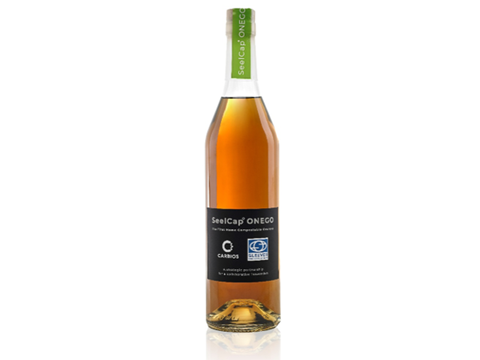
Carbios, Sleever, and Fabrice Peltier have developed what is claimed to be the ‘world’s first’ home-compostable tamper-evident seal, with enzymes said to biodegrade the material at ambient temperatures.
The SEELCAP ONEGO is a proprietary tamper-evident concept incorporating the Carbios Active enzyme for PLA into the biopolymer blend. Carbios explains that the encapsulated enzyme can be integrated directly into the plastic transformation process without requiring the modification of existing production lines.
The seal is said to completely disintegrate in any soil and composting conditions, even at room temperature, in less than six months – leaving behind ‘quality compost’ that is free of toxicity and microplastics. However, its TÜV Austria “OK Compost HOME” certification is still pending.
Its tamper-evident function is designed to achieve security for packaging, especially for glass packaging with wooden caps often used for wines, spirits, and alcohols. Conventional tamper-evident systems are said to be too small to fit into traditional sorting and recycling flows, so SEELCAP ONEGO is designed to serve as an alternative.
Additionally, its gripping flap is designed to enable consumers to easily open the seal in a single gesture.
The seal is expected to achieve a 70% reduction in carbon footprint compared to conventional shrink capsules, take steps towards circularity for packaging, and help brands address concerns for safety, traceability, and mass production.
Apparently, the solution easily integrates into existing filling lines and can be combined with Sleever’s Combishrink and Combiskinner shrink-fitting equipment. Its outputs range from 60 to 24,000 bottles per hour.
“I’m delighted to present SEELCAP ONEGO to the market, the first innovation resulting from our partnership with SLEEVER,” said Emmanuel Ladent, CEO of Carbios. “Thanks to the integration of CARBIOS Active, we have jointly developed the first tamper-evident seal that can be composted at ambient temperature, offering a valuable alternative when recycling is not an option. This is a concrete application of CARBIOS’ mission to find innovative and sustainable solutions to rethink the life cycle of all types of plastic.”
“SEELCAP ONEGO is a new eco-designed offer for tamper-evident packaging, the fruit of collaboration between the Sleever and Carbios teams, with the participation of designer Fabrice Peltier,” added Eric Fresnel, president of Sleever Group. “This breakthrough innovation in packaging security meets the needs of the wine, spirits and alcoholic beverages markets, particularly in countries where recycling channels for glass packaging have not yet been developed.”
An operational production line at Carbios’ headquarters in Clermont-Ferrand, France, already claims to be capable of producing 2,500 tons of Carbios Active every year – required for the equivalent of 50,000 annual tons of enzymated PLA, the company says.
The SEELCAP ONEGO solution will also be showcased at LuxePack Monaco at the Grimaldi Forum (30th September – 2nd October), both on Sleever’s stand (RF14, Hall Ravel) and Carbios’ (VA17, Hall Verrière).
The news comes after Carbios and Sleever announced a long-term contract to develop home-compostable, mono-oriented traverse shrink films for the labelling, wrapping, and security of wines and spirits, among other products. These solutions will also utilize Carbios Active.
An article published in the scientific journal Nature by Carbios and the Toulouse Biotechnology Institute explains that the engineered enzyme is only activated under composting or methanization conditions, meaning it does not biodegrade in storage, and can withstand a temperature of 170°C – the same temperature as molten PLA during the plastic production process.
In another sustainability-minded security solution, Securikett revealed a tamper-evident seal made of paper earlier this year. This solution intended to protect cardboard packaging against a range of tampering methods while contributing to a circular economy.
If you liked this story, you might also enjoy:
The ultimate guide to the Packaging and Packaging Waste Regulation in 2024
How are the top brands progressing on packaging sustainability?
Sustainable Innovation Report 2024: Current trends and future priorities
Everything you need to know about global plastic sustainability regulation














No comments yet